2014 Recipients of the Missouri Honor Medal for Distinguished Service in Journalism Announced
Awarded Annually Since 1930, the Medal Recognizes Lifetime or Superior Achievement
Columbia, Mo. (June 23, 2014) — The Missouri School of Journalism will award the prestigious Missouri Honor Medal for Distinguished Service in Journalism to a total of seven individuals and media organizations in print, digital and electronic journalism, photojournalism and advertising.
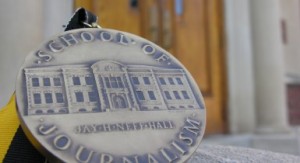
The 2014 medalists will be honored at a banquet on Tuesday, Oct. 28, on the University of Missouri campus. During the day they will present master classes on topics related to their areas of expertise to Missouri School of Journalism students and other guests.
| Master Class Schedule 2014 9:30-10:45 a.m.: The Guardian/James Ball 9-10 a.m.: WIRED/Mark Robinson 10-11 a.m.: Audie Cornish 11 a.m.-noon: Steve Kopcha 2-3 p.m.: Eugene Richards 2-3 p.m.: Kyiv Post 3:30-4:45: Barney Calame |
Medalists are selected by the faculty of the School on the basis of lifetime or superior achievement in journalism. The Missouri School of Journalism has awarded the Missouri Honor Medal for Distinguished Service in Journalism annually since 1930 to outstanding journalists, advertising and public relations practitioners, business people, institutions and media organizations from around the world.
Following are the 2014 medalists:
- Byron E. Calame, one of journalism’s most respected editors.
- Audie Cornish, co-host of the long-running, award-winning All Things Considered show on NPR.
- The Guardian, a 193-year-old newspaper with the third-largest English-speaking newspaper website in the world.
- Steve Kopcha, one of advertising’s most notable creative leaders.
- The Staff of the Kyiv Post, Ukraine’s leading English-language newspaper since 1995.
- Eugene Richards, an acclaimed documentary photographer, filmmaker and writer.
- WIRED, the outlet that illuminates how technology is changing people’s lives.
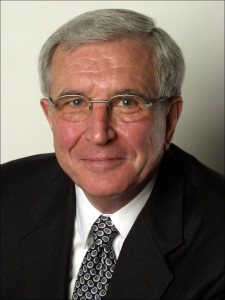
Byron E. Calame
Byron E. (Barney) Calame, BJ ’61, is one of journalism’s most respected editors. He dedicated himself to ethical journalism and to putting the reader first during his 39-year career at The Wall Street Journal and two-year term as public editor, or ombudsman, for The New York Times.
Calame joined The Journal in 1965 and held positions from reporter to bureau chief to an assistant managing editor to deputy managing editor. In his final position as the No. 2 person in The Journal’s news department, Calame was responsible for quality control and upholding ethical standards. As the readers’ representative at The Times, he had the responsibility for making sure their concerns were heard and publicly assessing the paper’s journalistic integrity.
From 1961-65, Calame served in the U.S. Navy as an officer and saw duty in Vietnam. In addition to his bachelor’s degree in journalism from Missouri, he earned a master’s degree in political science from the University of Maryland in 1966.
Calame has received numerous recognitions for his exceptional career contributions. These include the 2005 Gerald Loeb Lifetime Achievement Award and the 2002 Distinguished Achievement Award from the Society of American Business Editors and Writers.
The University of Missouri awarded Calame a Doctor of Humane Letters honorary degree in May 2011. The Penn State College of Communications awarded Calame the 2006 Bart Richards Award for Media Criticism for six public editor columns.
In recognition of his career-long dedication to safeguarding and strengthening the ethics of journalism.
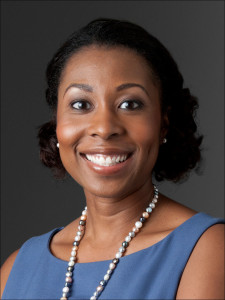
Audie Cornish
Audie Cornish is host, along with Robert Siegel and Melissa Block, of the long-running, award-winning All Things Considered show on NPR. Previously, she served as host of Weekend Edition Sunday. Prior to moving into that host position in the fall of 2011, Cornish reported from Capitol Hill for NPR News, covering issues and power in both the House and Senate and specializing in financial industry policy. She was part of NPR’s six-person reporting team during the 2008 presidential election and had a featured role in coverage of the Democratic National Convention in Denver.
Cornish came to Washington, D.C., from Nashville, where she covered the South for NPR.
Before coming to NPR, Cornish was a reporter for Boston’s award-winning public radio station WBUR. There she covered some of the region’s major news stories, including the legalization of same-sex marriage, the sexual abuse scandal in the Boston Roman Catholic Archdiocese, as well as Boston’s hosting of the Democratic National Convention. Cornish also reported for WBUR’s syndicated programming, including On Point as well as Here and Now, both distributed by NPR.
Cornish has served as a reporter for The Associated Press in Boston. She graduated from the University of Massachusetts at Amherst.
In recognition of her exceptional body of journalistic work across a wide range of themes, and her ability to convey to her audiences, with warmth and humor, the complexities of the human condition.

The Guardian
The Guardian is a 193-year-old British newspaper with the third-largest English-speaking newspaper website in the world, with 100 million unique browsers every month. From its beginnings in 1821 as a four-page weekly publication, the Guardian’s scope has expanded beyond its British daily national newspaper roots and is now a leading global digital media brand. All of the Guardian’s online journalism is accessible at www.theguardian.com, offering global audiences a single destination for the Guardian’s award-winning content wherever they are around the globe and across all devices.
The paper’s readers come from all backgrounds and walks of life. Nelson Mandela read the Guardian Weekly while he was incarcerated in Pollsmoor prison, describing it in his autobiography as a “window on the wider world.”
Alan Rusbridger has been editor of the Guardian since 1995 and has overseen the integration of the paper and digital operations. During his editorship the paper has fought a number of high-profile battles over libel and press freedom, including cases involving U.K. politicians Neil Hamilton and Jonathan Aitken, the Police Federation, Trafigura, freedom of information and Wikileaks.
The Guardian broke world-exclusive stories by publishing National Security Agency’s documents leaked by Edward Snowden and was recently awarded the Pulitzer Prize, the highest accolade in U.S. journalism, for public service. In April 2014 the Guardian was named newspaper of the year and won the top digital prize at the British press awards.
The Guardian is the only British national daily to conduct (since 2003) an annual social, ethical and environmental audit in which it examines, under the scrutiny of an independent external auditor, its own behavior as a company. It is also the first British daily national newspaper to employ a reader’s editor, or ombudsman, to handle complaints and corrections.
In recognition of its enterprise, innovation and creativity in informing the world about the world.
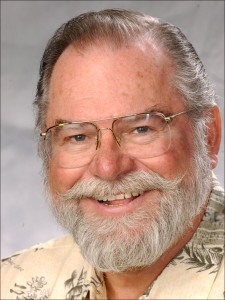
Steve Kopcha
Steve Kopcha, BJ ’63, is one of advertising’s most notable creative leaders. He served as an officer in the U.S. Navy after graduating from the Missouri School of Journalism. Following his active duty, Kopcha remained in the Naval Reserve, attaining the rank of lieutenant-commander. During this time, he joined the corporate advertising department of Monsanto Company in St. Louis.
Kopcha then joined D’Arcy Advertising as a copywriter on the Budweiser account. During his tenure at DMB&B, he received many advertising awards, including Clio and International Broadcasters.
Along the way to being elected executive vice president, chief creative officer of D’arcy Masius Benton and Bowles/Detroit and member of the worldwide Board of Directors, Kopcha created and supervised advertising for Anheuser-Busch, Pontiac, Cadillac, Buick, GMC Trucks, GM Parts, FTD, Whirlpool, Colgate-Palmolive, M&M/Mars, U.S. Air Force and Westinghouse. He also worked on special international projects, out of the London, Paris, Vienna and Mexico City offices of DMB&B.
Kopcha has been honored by the Wall Street Journal as a member of the elite Creative Leaders and was the first creative director ever named to the Board of Directors of the Adcraft Club of Detroit.
After retiring to a farm in Missouri for two years, Kopcha returned to the advertising business in 1996 as a senior vice president, creative planner at the Detroit office of McCann-Erickson.
Kopcha then retired – again – and lived in Santa Fe, New Mexico, before being called out of retirement by his alma mater. Kopcha taught several advertising courses at the Missouri School of Journalism in Columbia for nine years until he finally retired in 2010. Kopcha is an associate professor emeritus. He now lives in New Hampshire.
In recognition of a career of creativity and leadership in advertising, and of his generosity in sharing his knowledge and his talents with a new generation of advertising professionals.

The Staff of the Kyiv Post
The Kyiv Post has been Ukraine’s leading English-language newspaper since 1995. Often called the “World’s Window on Ukraine,” the Kyiv Post consists of an international, multilingual team of Ukrainian and Western journalists.
The weekly newspaper offered vital exclusive coverage of corruption scandals under former President Leonid Kuchma (1994-2004), including the 2000 murder of journalist Georgiy Gongadze, for which Kuchma was implicated but never put on trial.
The newspaper went online in 2002, expanding its international audience during the 2004 Orange Revolution, which overturned a rigged presidential election, and the 2013-14 EuroMaidan Revolution, which overthrew President Victor Yanukovych. The journalists risked their personal safety by covering Russia’s February invasion of Crimea and subsequent illegal annexation, as well as the Kremlin-backed separatist war in Ukraine’s eastern regions that continues today.
Online readership has increased dramatically because of the events, with more than 31 million page views in 2014 through June 16. Moreover, Moscow-based AGT Communications Agency found that the Kyiv Post was the single most-quoted Ukrainian source of news in the six-month period after Nov. 21, 2013, when Yanukovych triggered the revolution that toppled him by backing out of a political and economic association agreement with the European Union.
Throughout its existence, the Kyiv Post has led the charge for a free press in Ukraine and has held true to the highest ethical standards embodied in its motto of “Independence, Community, Trust.”
In 2013, a group of Kyiv Post journalists founded the nonprofit Media Development Foundation to advance development of the profession in Ukraine in three areas: investigative journalism, journalism internship exchanges and training programs for working professionals. The foundation in June organized the first-ever international conference on investigative journalism. Called Mezhyhirya Fest, the event was held at the billion-dollar estate of Yanukovych to coincide with the professional Journalism Day holiday on June 6. At the three-day event, the first Ukrainian “Pulitzer Prize” was awarded to TVi journalist Lyubomyr Ferens for his documentary on the January slayings of three EuroMaidan activists, allegedly on orders of Yanukovych and his former top advisers.
In recognition of courageous and determined professional reporting on behalf of democracy in the face of great personal risk.
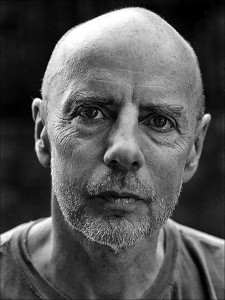
Eugene Richards
Eugene Richards is an acclaimed documentary photographer, filmmaker and writer. Born in Dorchester, Massachusetts, he earned his bachelor’s degree from Northeastern University. Richards then joined VISTA (Volunteers in Service to America) and was assigned to eastern Arkansas, where he helped found a social service organization and a community newspaper, Many Voices, which reported on black political action and the violence of the Ku Klux Klan.
Richards published his first book, “Few Comforts or Surprises: The Arkansas Delta” in 1973. Richards’s subsequent books include “Stepping Through the Ashes” (2002), an elegy to those who lost their lives on Sept. 11, 2001; “The Fat Baby” (2004), a collection of 15 photographic essays produced both on and off assignment; “A Procession of Them” (2008), which chronicles the plight of the world’s mentally disabled; “The Blue Room” (2008), a study of the forgotten and abandoned houses of rural America; “War Is Personal” (2010), a chronicle of the human cost of the Iraq war; and “Red Ball of a Sun Slipping Down” (2014), a portrayal of life in the Arkansas Delta more than 40 years ago and the way it is now.
Among numerous honors, Richards has been the recipient of a Guggenheim Fellowship, the Kraszna-Kraus Book Award, the W. Eugene Smith Grant in Humanistic Photography, the Olivier Rebbot Award from the Overseas Press Club, three Canon Photo Essayist Awards and the Robert F. Kennedy Lifetime Achievement Journalism Award for coverage of the disadvantaged. A film written and directed by Richards, “But, The Day Came,” was named Best Short Film at the Full Frame Documentary Film Festival. His photographs have been exhibited in more than 40 solo shows in the United States and abroad.
In recognition of his life’s work capturing people’s struggles and aspirations through brilliant photography.

WIRED
WIRED reports how emerging technologies affect business, culture, innovation and science. The brand reaches more than 30 million people each month through WIRED.com, the digital edition, the magazine, social media and live events. Owned by Condé Nast, WIRED was first published in 1993 and is headquartered in San Francisco.
WIRED has won 14 National Magazine Awards, including General Excellence, the industry’s highest honor, four times. In 2014, WIRED was recognized with six National Magazine Award nominations, five Webby Award wins and 12 Society of Publication Design Awards. WIRED was also named the “Brand to Watch” by Advertising Age and featured in Adweek‘s 2013 Hot List as “The Hottest Magazine in Digital.”
In recognition of rigorous and innovative journalism, which has recorded the turbulent saga of the media technology revolution.
Updated: July 27, 2020